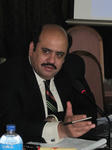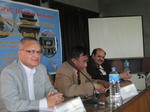HRB - HiPeC Reseachers Blog
ヒロシマ大学発:平和構築連携融合事業の推進をめぐる事務局メンバーの日常
In this March, We HiPeC-CNAS office has managed two seminar as below.
Activity 1:
On March 16th, HiPeC-CNAS office hosted the 2nd international seminar in Tribhuvan University.
>>>>>>>>>>
CNAS-HiPeC International Seminar on “Federalism for Inclusive Democracy in Nepal”
(jointly organized by Center for Nepal and Asian Studies (CNAS), TU and Hiroshima University Partnership Project for Peacebuilding and Capacity Development (HiPeC), Hiroshima University (HU) at CNAS, TU, Kirtipur)
HiPeC is a research project started in 2005 at HU.
Hiroshima University, with its long history of peace studies, also started the research on peacebuilding issues, a new phenomenon after the end of the Cold War. Practice in peacebuilding went much ahead of research on peacebuilding so that HiPeC is organized to have close partnership with those practitioners’ organizations assisting peacebuilding such as United Nations Institute for Training and Research and Japan International Cooperation Agency.
CNAS-HiPeC project is a part of such collaboration that brought leaders, scholars, activist and young researchers from the government, civil societies, research institutes, political parties and rebel sides of the conflict to let them exchange their experiences on different dimension of conflict and peace processes. These activities put the people at the place of conflict at the centre of peace and post-conflict reconstruction.
This is the second international one day seminar we have conducted after the implementation of CNAS-HiPeC project in Nepal. The main aim of the conference was to let the scholars, activists, politicians and civil society to discussion on the issues of federalism that can promote inclusive democracy in regards to stable peace in Nepal from the experience and knowledge of different society from different countries. During the seminar the issues and the experiences of Sri Lankan focusing on federalism as an alternative to separation, narratives of high caste women during the Maoist conflict in Nepal, conflict created by loosing indigenous people rights on ancestral domains in Philippines, issues of social inclusion of Muslim minority in the case of Education in Nepal, issues of preserving Himalayan religion and cultural identity in Nepal and issues of Federalism, Ethnicity, and Inclusive democracy for the small Janajaties in periphery in Nepal were presented. The discussion of the conference mainly emphasized on the issues of federalism and inclusion.
The seminar concluded that what ever the issues in federalism and inclusion, the process have already been went forward so that it is better to have more concrete work on establishing and promoting the process and the way so that a stable and peaceful Nepal can be established in future.
It is expected that the seminar will add a drop in the Ocean for state building and over all peace process in Nepal which is the main aim of CNAS-HiPeC Nepal.
Activity 2:
On March 31th, HiPeC-CNAS office invited Prof. Zafar Nawaz Jaspal from Pakistan and organized the 3nd internal seminar in Tribhuvan University, CNAS.
>>>>>>>>>>>>>
Summary of 3rd Internal Seminar
Title: Religious Extremism and Militancy in Pakistan and its Implications in South Asia
Speaker: Associate Professor Dr. Zafar Nawaz Jaspal, Quaid-I-Azam University, Islamabad, Pakistan
Dr. Jaspal’s presentation was very much inside and stressed on the real Pakistani’s situation in current context and Pakistan linkages with religious extremist groups and reality of Militancy in Pakistan. He has linked the past political action including President Zai’s strategy to combat Soviet’s Afghanistan intervention with support of US and others to the current situation of religious extremism and militancy. He has mentioned that the eccentric Islamic religious groups that politicize and exploit the religion for vested interest of Islamic leaders which gradually foster extremism and militancy in Pakistan effecting the over all region. He mentioned that competing theological philosophies, weak popular support, suspension of democratic political system, Islamic revivalism in overall Muslim world, oil riches of Gulf States and above all regional environment have deepened the sectarian divide and religious extremism. Giving the example of linkage of Pakistani’s extremist groups with Afghanistan, India and other countries, he mentioned that there is link with so called terrorist attracts and the extremist group in Pakistan, even the Pakistan’s government officially denied the link. Even thought the Pakistan’s Arm forced had conducted successful military operation against some groups in Swat and South Waziristan to show international community, they have been facilitating and providing sanctuaries to the transnational terrorist organization, including Al Qaeda.

The presentation provided factual linkage of the contributory dynamics of extremism in Pakistan with current supporting and sustaining factors, the financial advantageous, recruitment and where it is heading forward. He has provided sufficient evidence to support the above facts.
As concluding observations he has mentioned that the religious extremism and militancy is spreading like viral virus in the society of Pakistan. Ideological motivation through biased interpretation of Islamic norms; ability to freely move across countries; financial backing through illicit trade; adept in use of communication technology; and above all the protracted global war on terrorism are important sustaining and enduring constituent of religious extremism and militancy in Pakistan.
In end he mentioned that the presence of transnational terrorist groups through Pakistan has sever internal and external consequence for the state, for Pakistani society and South Asian security in general.
In end he mentioned that the presence of transnational terrorist groups through Pakistan has sever internal and external consequence for the state, for Pakistani society and South Asian security in general.
More than 40 well known scholars, peace negotiators, officers and activist including Ex. Army General Rookmangad Katawal, Daman Nath Dungana, Rector of Tribhuvan University Prof. Dr. Surya Lal Amatya, Vice Chancellor of Lumbini Bhudha University, secretary of Constitutional Assembly, former a
mbassador Hiranya Lall Shrestha and others have participated in the presentation and actively contributed in open discussion. All the participants in open discussion are happy to hear real Pakistan’s view and situation. They commented that the presentation has mad
e clear to the religious extremism and Militancy.

The discussions are mainly concentrated on implications of religious extremism in South Asia and Nepal as well. Some of the questions ar
The discussions are mainly concentrated on implications of religious extremism in South Asia and Nepal as well. Some of the questions ar
e related with rapidly expanding Christianities in Nepal and its future impacts.
(Activity Report ends.)
PR
<< 第20回ハイペック学内研究会
HOME
Special Thanks: "Peace-Process Exchange Workshop" Successfully ended(終了御礼) >>
[31] [36] [35] [33] [34] [29] [28] [30] [27] [26] [25]
[31] [36] [35] [33] [34] [29] [28] [30] [27] [26] [25]
この記事にコメントする
この記事へのトラックバック
この記事にトラックバックする:
カレンダー
| 11 | 2025/12 | 01 |
| S | M | T | W | T | F | S |
|---|---|---|---|---|---|---|
| 1 | 2 | 3 | 4 | 5 | 6 | |
| 7 | 8 | 9 | 10 | 11 | 12 | 13 |
| 14 | 15 | 16 | 17 | 18 | 19 | 20 |
| 21 | 22 | 23 | 24 | 25 | 26 | 27 |
| 28 | 29 | 30 | 31 |
フリーエリア
最新記事
(02/20)
(02/12)
(12/12)
(12/07)
(12/03)
最新TB
プロフィール
HN:
ピー助(Peace-Ke)
年齢:
15
HP:
性別:
男性
誕生日:
2010/04/01
職業:
平和構築
趣味:
連携融合
自己紹介:
〔ピー助〕朝の来ない闇はない。朝の来ない魚市場もない。
〔飼い主からの一言〕ハイペック(広島大学平和構築連携融合事業)は、広島大学の基本理念である「平和を希求する精神」を具体的に追及するため、オール・ヒロシマ体制で平和構築支援の研究を推進します。マスコットキャラクターの平和構築猫「ピー助(Peace-Ke)」ともども、なにとぞよろしくお願いいたします。
〔飼い主からの一言〕ハイペック(広島大学平和構築連携融合事業)は、広島大学の基本理念である「平和を希求する精神」を具体的に追及するため、オール・ヒロシマ体制で平和構築支援の研究を推進します。マスコットキャラクターの平和構築猫「ピー助(Peace-Ke)」ともども、なにとぞよろしくお願いいたします。
ブログ内検索
P R
カウンター
画像を食べちゃうひつじパーツ
アクセス解析

